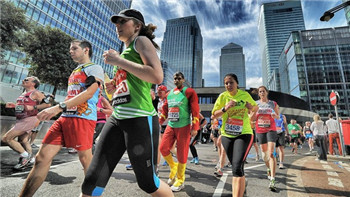(单词翻译:单击)

It has long been known that regular, moderate exercise is one of the best things you can do for your health, with studies showing that trained athletes have increased levels of natural killer cells that fight infection. But as anyone who practises endurance sports probably knows, hard training for an event like a cycle race or a marathon run can leave you with a dandy head cold or other upper respiratory tract infection (URTI).
人们很早以前就知道,定期而适度的锻炼是对健康最有益的事情之一。研究表明,受过训练的运动员体内抗感染的“自然杀伤细胞”水平升高。不过,练习耐力运动的人也许都知道,为参加自行车比赛或马拉松长跑这样的赛事而开展的艰苦训练,可能会让你患上头伤风或其他上呼吸道感染(URTI)。
At the moment I’m trying to fight off a suspicious soreness in my throat, a warning sign that a URTI may be on the way. I wondered: what is it about working out and sweating heavily that makes you more vulnerable to illnesses?
眼下,我正在对付自己喉咙中的可疑疼痛感,这是个警告信号,显示我可能已得了上呼吸道感染。我奇怪的是:锻炼和大量出汗怎么会令人更容易得病呢?
David Nieman, a researcher, tracked 2,311 participants in the 1987 Los Angeles marathon and came up with some startling results: during the week following the race, 12.9 per cent of runners reported being sick, compared with 2.2 per cent of control runners who did not take part in the race that year.
研究人员戴维尼曼(David Nieman)通过追踪1987年洛杉矶马拉松的2311名参赛者,得出了一些令人吃惊的结果:在比赛结束后的那周里,12.9%参赛者曾报告身体不适;相比之下,没有参加比赛的对照组跑步者感到不适的比例只有2.2%。
One of Dr Nieman’s findings was that prolonged intense exercise caused the athletes’ immune systems to respond as if they were fighting infections, with a sharp increase in stress hormones and inflammation-fighting cells called neutrophils and monocytes after the run.
尼曼的一个发现是,长时间的高强度锻炼,会使运动员的免疫系统做出仿佛在对抗炎症的反应。在跑完马拉松之后,选手们的应激激素、以及被称为中性粒细胞及单核白血球的抗炎细胞因子急剧升高。
In addition, other research has found that mucosal systems — the moist bits in the mouth, nose and eyes — produce a substance called secretory immunoglobulin A (SIgA), which is the body’s first line of defence against pathogens such as colds and the flu.
此外,其他一些研究发现,人的粘膜系统(口腔、鼻腔和眼睛中的湿润部位)会产生一种叫做“分泌型免疫球蛋白A”(SIgA)的物质,这是躯体抵御感冒和流感等病原体的第一道防线。
But SIgA has been shown to decline after a heavy stretch of training. “Consensus exists that reduced levels of saliva SIgA are associated with increased risk of URTI during heavy training,” said one study.
然而,在经过持续大量锻练之后,研究显示SIgA的水平会下降。研究报告表示:“存在这样一个共识,高强度锻练期间,唾液中SIgA水平的下降与患上呼吸道感染的风险增大存在联系。”
Everyone’s mother has a favourite treatment for a cold, but here are a few with scientific support.
每一位妈妈都有各自偏爱的治疗感冒的方法,这里却要列举几个有科学依据的疗法。
One of the most widely studied is the mineral zinc, which has been shown to inhibit replication of the rhinovirus, which is the cause of about 40 per cent of colds. The Journal of the American Medical Association reported in 2014 that “oral zinc is associated with a shorter duration of the common cold in healthy people”, but other studies have found mixed results.
被研究得最多的治感冒药物之一是矿物锌,它被证明能抑制鼻病毒的复制,后者是约40%感冒的罪魁祸首。《美国医学会杂志》(Journal of the American Medical Association)曾在2014年称,“口服锌与健康人群普通感冒持续时间缩短有关”。不过,其他研究则显示了相互矛盾的结果。
The primary reason, according to George Eby, the US researcher who discovered zinc’s effect on colds, is that only positively charged ionic zinc is effective against infections, so athletes should look for lozenges containing zinc acetate or zinc gluconate, not commonly available zinc citrate.
发现锌对感冒有用的美国研究人员乔治伊比(George Eby)认为,主要的原因在于,只有带正电荷的锌离子具有抗感染功效。因此,运动员应该服用含有乙酸锌或葡萄糖酸锌的药片,而不是常见的柠檬酸锌。
One Cochrane Review of data in 2013 found that the much touted Vitamin C generally failed to protect against colds, although it may offer some benefit to heavy exercisers.
2013年《考科蓝回顾》(Cochrane Review)的一项数据显示,倍受吹捧的维生素C通常不能预防感冒——尽管它可能对高强度锻炼者有某些益处。
Another nutritional supplement recently studied is a green alga known as chlorella. One relatively small study found that athletes who took chlorella during heavy training did not suffer the same reduction in SIgA that other athletes did.
另一种最近被研究的营养补充剂是一种被称为小球藻的绿藻。一项规模相对较小的研究发现,在高强度训练期间服用小球藻的运动员并未出现与其他运动员一样的SIgA减少现象。
Finally, a simple but effective protection and cure that is common in Japan, but less so in North America or Europe: gargling. A randomised controlled trial in Japan showed that the occurrence of respiratory tract infections was significantly reduced in people who gargled several times a day. The most effective gargle was tap water, not the various medicinal gargles available, most probably because chlorine added to drinking water inhibits viruses.
最后,一个很简单而又有效的防治方法是漱口,这种方法在日本十分常见,在北美或欧洲却不那么普遍。在日本开展的一项随机对照试验显示,在一天多次漱口的人群中,呼吸道感染的发生率显著降低。最有效的漱口水是自来水,而不是市面上可以见到的各种药用漱口水,最有可能的原因是饮用水中添加的氯能够抑制病毒。


